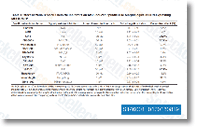In ALCL, ALK expres sion includes a powerful clinical prognostic significance. Com pared with ALK adverse ALCL, ALK good ALCL takes place more often in younger patients who respond very well to chemotherapy and have a favorable clinical outcome. The mechanisms of cell transformation mediated through the ALK oncoprotein are only partially understood. Nonetheless, the NPM ALK induced activation of mammalian target of rapamycin, both transduced with the mitogen induced extracellular kinase /extracel lular signal regulated kinase signaling pathway, or to a considerably significantly less degree, through the phosphatidylinositol 3 kinase/protein kinase B pathway is proven to contribute on the tumorigenesis of ALCL. In ALK ALCL cell lines and tumors, the mTOR signaling proteins, such as mTOR, eukaryotic initiation component 4E binding protein 1, plus the 70 kDa ribosomal pro tein S6 kinase polypeptide 1 kinase are really phosphorylated.
Inhibition of mTOR with rapamycin or silencing mTOR gene product selelck kinase inhibitor expression working with mTOR certain tiny interfering RNAs decreased phosphorylation in the mTOR signaling proteins and induced cell cycle arrest and apoptosis in ALK ALCL cells, indicating that blockage from the mTOR signaling pathway repre sents FTY720 S1P Receptor inhibitor a prospective therapeutic strategy in ALK ALCL. However, there is minor evidence demon strating the clinical prognostic worth from the mTOR path way activation in ALCL. In this comparatively big situation research, we showed the AKT/mTOR pathway was hugely activated in ALK ALCLs compared with ALK instances. Phosphorylation of AKT and mTOR was corre lated on the expression of ALK, suggesting an activated ALK/AKT/mTOR pathway in ALK ALCL, and this acti vation pathway was more confirmed by overexpression of NPM ALK within the nonmalignant murine professional B lymph oid cell line, BaF3.
In contrast to ALK expression, expres sion of p AKT, p mTOR, p 4E BP1, or p p70S6K1 didn’t have any prognostic significance in ALCL, nonetheless, in vitro research indicated that targeting the hyperactivated AKT/mTOR pathway correctly inhibited cell growth, triggered apoptosis, and reversed glucocorticoid re sistance, suggesting an interesting therapeutic potential of AKT/mTOR  inhibitors in ALCL. Strategies Tumor samples The tumor specimens were obtained from 103 individuals with ALCL who underwent biopsy between January 2005 and October 2012 at the Division of Pathology, West China Hospital of Sichuan University, or the Depart ment of Pathology, Shanghai Childrens Healthcare Center of Shanghai Jiaotong University. None from the individuals had re ceived any remedy in advance of surgical procedure.
inhibitors in ALCL. Strategies Tumor samples The tumor specimens were obtained from 103 individuals with ALCL who underwent biopsy between January 2005 and October 2012 at the Division of Pathology, West China Hospital of Sichuan University, or the Depart ment of Pathology, Shanghai Childrens Healthcare Center of Shanghai Jiaotong University. None from the individuals had re ceived any remedy in advance of surgical procedure.
Microrna 1
Combinatorial regulation is a feature of miRNA regulation in animals.
